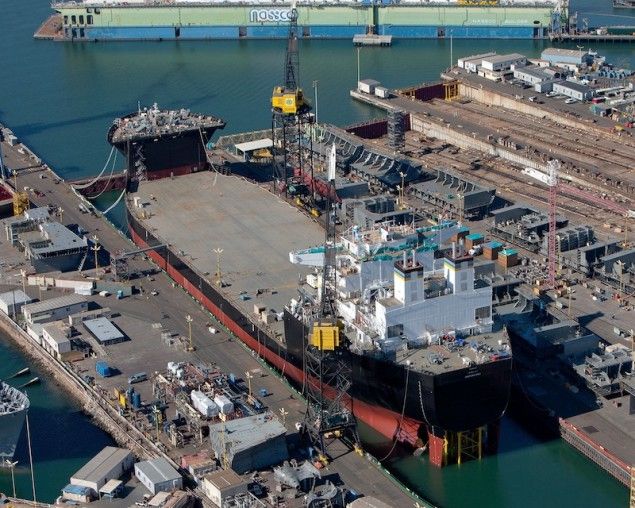The Navy’s first Mobile Landing Platform, USNS Montford Point (MLP 1), successfully completed builder’s sea trials March 20, in San Diego.
Builder’s trials test the vessel’s propulsion, ballasting, communications, navigation and mission systems, as well as related support systems.
General Dynamics National Steel and Shipbuilding Co. (NASSCO) constructed MLP 1.
“This first-of-class ship performed very well during builder’s trials, a testament to the preparation and dedication of the Navy-industry team in designing and building this transformational platform,” said Strategic and Theater Sealift program manager Capt. Henry Stevens. “The ship performed well, and pending additional trials and delivery later this year, MLP 1 will help transition the Navy toward increased modularity and operational flexibility in its ships.”
Following the completion of builder’s trials, NASSCO will conduct any remaining corrective actions required in preparation for acceptance trials that will be conducted by the U.S. Navy’s Board of Inspection and Survey in mid-April.
MLP is based on an existing commercial design, the Alaska-class crude oil carrier, ensuring design stability and lower development costs.
MLP is a highly flexible platform that will provide capability for large-scale logistics movements, such as the transfer of vehicles and equipment from sea to shore. It will significantly reduce dependency on foreign ports and provide support in the absence of any port, making an MLP especially useful during disaster response, and for supporting Marines once they are ashore.
The ship will leverage float-on/float-off technology, allowing Montford Point to partially submerge, facilitating easy movement of cargo and craft. Additionally, the ship’s size allows for 25,000 square feet of vehicle and equipment stowage space and 380,000 gallons of fuel storage.
With this set of capabilities, the ship is able to easily transfer personnel and vehicles from other vessels, such as the large, medium-speed, roll-on/roll-off ships (LMSRs) onto landing craft air cushioned (LCAC) vehicles and transport them ashore.
The platform, with its open, reconfigurable mission deck, will serve as an important flexible and transformational asset to the Navy, as it can be reconfigured to support a wide variety of future operations.
The ship is expected to be delivered to the Navy in fiscal year 2013 and operational in fiscal year 2015.
As one of the Defense Department’s largest acquisition organizations, PEO Ships is responsible for executing the development and procurement of all destroyers, amphibious ships, special mission and support ships, and special warfare craft. Delivering high-quality war fighting assets – while balancing affordability and capability – is key to supporting the Navy’s Maritime Strategy.










